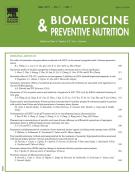Evaluation of genotoxic and antioxidant activity of an Aesculus hippocastanum L. (Sapindaceae) phytotherapeutic agent - 14/08/13

Abstract |
Aesculus hippocastanum L. (Sapindaceae), vulgarly known as horse chestnut, is a native European plant, but widely distributed all over the world. The parts used in medicine are the seeds and the bark of young branches. The seed extract has been marketed as a phytotherapeutic product and it is extensively recommended for treatment of chronic venous insufficiency, traumatic edema, hemorrhoid and postoperative edema. Most of the beneficial effects of horse chestnut are attributed to its principal component aescin. The present study aims to evaluate the citotoxic, genotoxic, mutagenic, and antioxidant activity of this seed extract by performing a set of bacterial and cell-free tests. Phytochemical screening and thin layer chromatography confirmed the presence of aescin as well as others chemical constituents in the studied extract. Negative results were obtained for the occurrence of double-strand breaks in pBCKS plasmid DNA. Two different effects were detected in Escherichia coli strains CC104 and CC104mutMmutY: mutagenic (non-oxidative lesions) and antioxidant. The mutagenic effect was confirmed by Kado assay, where the extract was considered weakly mutagenic towards frameshift mutations. Moreover, the extract demonstrated to protect bacterial cells from lesions induced by mitomycin C, suggesting an antioxidative potential. A. hippocastanum seed extract demonstrated to be genotoxic and weakly mutagenic, as well as antioxidative.
Le texte complet de cet article est disponible en PDF.Keywords : Aesculus, Phytotherapic product, Kado assay
Abbreviation : AH
Plan
Vol 3 - N° 3
P. 261-266 - juillet 2013 Retour au numéroBienvenue sur EM-consulte, la référence des professionnels de santé.
L’accès au texte intégral de cet article nécessite un abonnement.
Déjà abonné à cette revue ?

